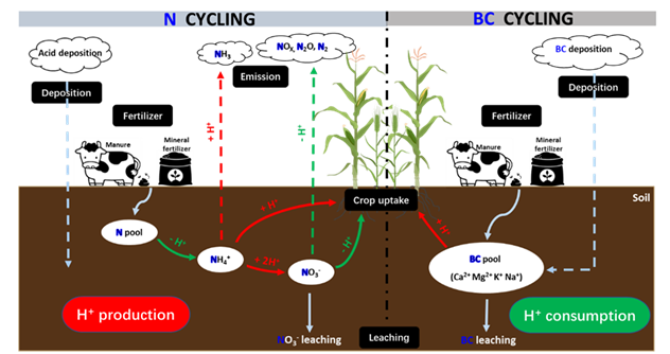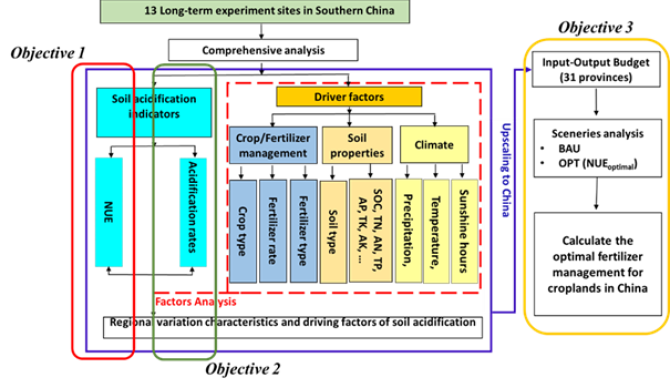
Project
Impacts of management, climate and soil properties on nitrogen use efficiency and soil acidification in croplands in China
High fertilizer N inputs, in combination with elevated levels of acid atmospheric deposition, cause soil acidification, due to increased leaching of base cations in response to elevated nitrate leaching. Together these processes might lower the crop production when soil pH levels decline below the critical levels required for optimum crop growth. The adverse impacts of high N inputs on N losses and soil acidification are highly influenced by management, climate, and soil properties. Both nutrient losses and soil acidification can be counteracted by proper management measures including manuring and liming.
Introduction
Soil acidification is increasingly causing a decline in soil fertility, limiting agronomic yield potential. Addressing and rectifying soil acidification is crucial for ensuring sustainable agricultural practices, particularly in China.
The excessive use of mineral nitrogen (N) fertilizers contributes to nitrate leaching, which is associated with base cations, thereby inducing soil acidification and, in the long term, suppressing yields due to low soil pH values. The negative effects of mineral N fertilizer input on soil acidification are significantly influenced by fertilizer management (dosage and type) and climate, impacting both nitrogen use efficiency (NUE) and soil properties that determine the acid-neutralizing capacity (base cation content) of the soil.
In comparison to mineral N fertilizer, the application of manure can prevent acidification due to its alkalinity and high base cation content. A systematic examination of the long-term effects of various combinations of mineral N fertilizers and manure on NUE and soil acidification rates can contribute to optimizing fertilizer and manure management, mitigating the adverse impacts of soil acidification.
Objectives
The main aim is to gain insight of the long-term impacts of mineral and manure fertilizer on NUE and soil acidification rates for different fertilizer management, crop types, climate and soil properties. This insight is then used to assess how to combine mineral fertilization and manure and/or liming counteract or avoid adverse impacts of soil acidification and improve the nutrients use efficiency.
Methods
To gain insight of the impacts of crop/fertilizer management (crop types, fertilizer rate, fertilizer types), climate (precipitation, temperature and sunshine hours) and soil properties (e.g., soil type, soil organic matter content, total and available contents of N, phosphate and potassium) on NUE and soil acidification, we will (i) assess NUE and (ii) soil acidification rates at the 13 experimental plots as a function of N fertilizer rate and type (inorganic versus organic fertilizers) for different combinations of crop, climate and soils, and (iii) predict impacts of different fertilizer and manure management options on N and P surpluses and on soil acidification rate to assess the optimal ratio of manure and fertilizer combinations over China.


(Expected) results
- Paper 1 Long-term impacts of mineral and organic fertilizer inputs on nitrogen use efficiency for different cropping systems and site conditions in Southern China.
- Paper 2 The contribution of natural and anthropogenic causes of on soil acidification rates under different fertilization practices and site conditions.
- Paper 3 Variations in optimal fertilizer and lime management to counteract soil acidification and minimize nutrient losses for cropland over provinces in China.
Publications
Zhu, X., G.H. Ros, M. Xu, Z. Cai, N. Sun, Y. Duan and W. de Vries, 2023. Long-term impacts of mineral and organic fertilizer inputs on nitrogen use efficiency for different cropping systems and site conditions in Southern China. Europ. J. Agronomy 146: 126797. https://doi.org/10.1016/j.eja.2023.126797